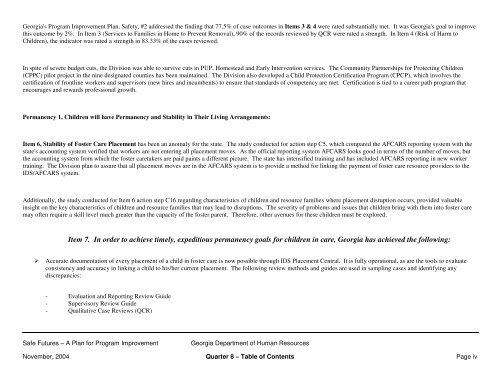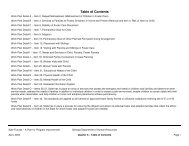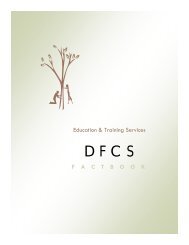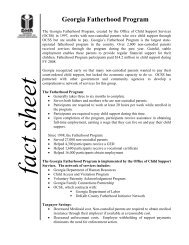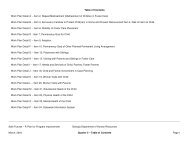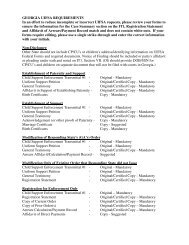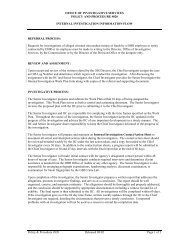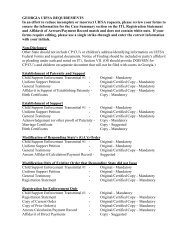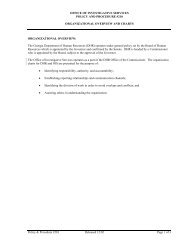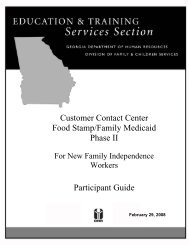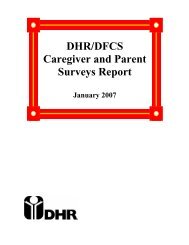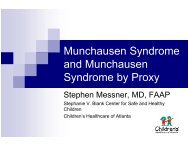an overview georgia program improvement plan - Department of ...
an overview georgia program improvement plan - Department of ...
an overview georgia program improvement plan - Department of ...
Create successful ePaper yourself
Turn your PDF publications into a flip-book with our unique Google optimized e-Paper software.
Georgia's Program Improvement Pl<strong>an</strong>, Safety, #2 addressed the finding that 77.5% <strong>of</strong> case outcomes in Items 3 & 4 were rated subst<strong>an</strong>tially met. It was Georgia's goal to improve<br />
this outcome by 2%. In Item 3 (Services to Families in Home to Prevent Removal), 90% <strong>of</strong> the records reviewed by QCR were rated a strength. In Item 4 (Risk <strong>of</strong> Harm to<br />
Children), the indicator was rated a strength in 83.33% <strong>of</strong> the cases reviewed.<br />
In spite <strong>of</strong> severe budget cuts, the Division was able to survive cuts in PUP, Homestead <strong>an</strong>d Early Intervention services. The Community Partnerships for Protecting Children<br />
(CPPC) pilot project in the nine designated counties has been maintained. The Division also developed a Child Protection Certification Program (CPCP), which involves the<br />
certification <strong>of</strong> frontline workers <strong>an</strong>d supervisors (new hires <strong>an</strong>d incumbents) to ensure that st<strong>an</strong>dards <strong>of</strong> competency are met. Certification is tied to a career path <strong>program</strong> that<br />
encourages <strong>an</strong>d rewards pr<strong>of</strong>essional growth.<br />
Perm<strong>an</strong>ency 1, Children will have Perm<strong>an</strong>ency <strong>an</strong>d Stability in Their Living Arr<strong>an</strong>gements:<br />
Item 6, Stability <strong>of</strong> Foster Care Placement has been <strong>an</strong> <strong>an</strong>omaly for the state. The study conducted for action step C5, which compared the AFCARS reporting system with the<br />
state's accounting system verified that workers are not entering all placement moves. As the <strong>of</strong>ficial reporting system AFCARS looks good in terms <strong>of</strong> the number <strong>of</strong> moves, but<br />
the accounting system from which the foster caretakers are paid paints a different picture. The state has intensified training <strong>an</strong>d has included AFCARS reporting in new worker<br />
training. The Division pl<strong>an</strong> to assure that all placement moves are in the AFCARS system is to provide a method for linking the payment <strong>of</strong> foster care resource providers to the<br />
IDS/AFCARS system.<br />
Additionally, the study conducted for Item 6 action step C16 regarding characteristics <strong>of</strong> children <strong>an</strong>d resource families where placement disruption occurs, provided valuable<br />
insight on the key characteristics <strong>of</strong> children <strong>an</strong>d resource families that may lead to disruptions. The severity <strong>of</strong> problems <strong>an</strong>d issues that children bring with them into foster care<br />
may <strong>of</strong>ten require a skill level much greater th<strong>an</strong> the capacity <strong>of</strong> the foster parent. Therefore, other avenues for these children must be explored.<br />
Item 7. In order to achieve timely, expeditious perm<strong>an</strong>ency goals for children in care, Georgia has achieved the following:<br />
Accurate documentation <strong>of</strong> every placement <strong>of</strong> a child in foster care is now possible through IDS Placement Central. It is fully operational, as are the tools to evaluate<br />
consistency <strong>an</strong>d accuracy in linking a child to his/her current placement. The following review methods <strong>an</strong>d guides are used in sampling cases <strong>an</strong>d identifying <strong>an</strong>y<br />
discrep<strong>an</strong>cies:<br />
- Evaluation <strong>an</strong>d Reporting Review Guide<br />
- Supervisory Review Guide<br />
- Qualitative Case Reviews (QCR)<br />
Safe Futures – A Pl<strong>an</strong> for Program Improvement<br />
Georgia <strong>Department</strong> <strong>of</strong> Hum<strong>an</strong> Resources<br />
November, 2004 Quarter 8 – Table <strong>of</strong> Contents Page iv


